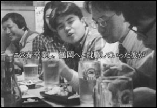|
|
 |
監督・脚本・撮影・編集・製作:川口肇 Director, Script, Photography, Editing, Producer : Kawaguchi Hajime |
| アンドレ・バザンなら、その機械的に記録されたイメージを存在論的なリアリズムとして評価したに違いない。とはいえ、このようなイメージは結局単なるテクストにすぎない。つまり、他の表意システムとの相互関係の中で同時に存在する一連の記号の集合体にすぎないのだ。川口肇監督は山形の東北芸術工科大学の教員をしながら、彼の身近な学生や同僚、そして日常生活を撮影している。だが、これらのカット自体はなんら意味をもったものではなく、川口が他のテクストと合成し編集していく過程で、はじめて意味を成していくものなのだ。まず彼はスローモーションや静止などのフレームを記号的に編集して、登場人物を浮き彫りにし、それから映像の上に重ねて映写されたテクストを肉声や機械音で読み出して、ストーリーを生み出していく。このようにして幾重にも重ねられたテクストが、混在した登場人物の人間関係とオーバーラップし、川口自身に関する叙述を効果的に演出しているのだが、その手法は個人映画の潮流とちょうどマッチしているようだ。だが、このテクストによる叙述はどれだけリアリティーに迫ったものなのだろうか?テクストが幾重にも増幅していくにしたがって、個人映画の手法に対する川口の鋭い批判的な態度から、テクストの中心にいる“私”も増幅させられていく。テクストを読み上げ、現実と虚構の境界線を築いてきたかにみえる“私”という主体は徐々に不確かなものとなっていくのだ。 (アーロン・ジェロー) |
Andre Bazin may have prized the technologically recorded image
for its ontological realism, but it is, in the end, only a text,
a set of signs that always exists in interconnection with other
signifying systems. Kawaguchi Hajime, an instructor at Yamagata's
Tohoku University of Art and Design, uses his video camera to
record everyday events and the people around him. None of this,
however, bears any meaning until he begins joining it with other
texts: first the coded manipulations of slow motion and freeze
frames which draw out the protagonists, and second, the writing
superimposed on the image that, read in voice over by both human
and mechanical voices, begins to generate a story. This interconnecting
of texts overlaps with an intermingling of individuals, creating
a surprising and effective narrative about Kawaguchi that seems
to accord well with the dominant current of personal film. But
just how real is this narration of texts? In Kawaguchi's clever
critique of personal film, as the texts multiply, so does the
" I " at their center, undermining the subject which both speaks
the text and supposedly authenticates its division between reality
and fiction. - Aaron Gerow |